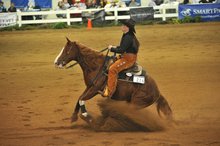The school year is kicking off and it is not too late to start an Intercollegiate Horse Shows Association (IHSA) program at your college or university.

An IHSA reining champion
The IHSA was established so that any full-time college student could participate in equestrian competition regardless of economic status, gender or riding level.
© 2017 by Rich Ormanowski
There is a long list of benefits to starting an IHSA program. First, it provides the opportunity for any college student that is a hunter seat or western rider of any means at any level to compete on a team. Riders compete as individuals and as a team.
Both men and women may compete. Most importantly, being a member of IHSA is a way to connect to others through your love of horses while building friendships that last a lifetime.
“I was still heartbroken from selling my horse when I left for college,” said Melisse Mossy, founder of the University of Southern California (USC) IHSA team. “I sent away for information (before the Internet) and waited anxiously for the packet that would tell me how to start a team to be part of the IHSA.”
The basic steps involved with starting an IHSA team are to locate your IHSA Zone and contact the Zone Chair to determine which Region you would join.
The Regional President is the greatest resource for learning about the IHSA and how to get a team up and running. You should contact your college or university and inform them of your intentions.
In some instances, you may work through the school’s athletic department, recreation/club sports even equine-related academic department. Find an adviser, a coach and a facility. Then, recruit team members.
Mossy set up a table on the USC mall and recruited members. With her small team formed, she approached the Los Angeles Equestrian Center Riding School to be their team coach. They agreed and offered to discount the lessons.
“We practiced there alongside the USC Polo Team,” she said. “We recruited enough members at every level for both hunter seat and Western. My boyfriend at the time, now my husband, even competed in Walk Trot Western to help us earn the points we needed.”
The USC IHSA team Mossy formed was formidable. In their first year, they qualified to participate in Regional Finals and Nationals. Not long after, they went on to host Nationals."
“To me, being a part of USC Equestrian was being a part of something bigger,” Mossy said. “It’s a team at all different levels, all with different gifts – a diversity that makes you strong. It’s about friendships and memories, trying something new and working hard to achieve the results. Founding the USC Equestrian Team changed my life.”
Click here for information about how you can start an IHSA Team.
About IHSA
The IHSA was founded in 1967 by Robert Cacchione while he attended Fairleigh Dickinson University in Teaneck, New Jersey. The organization was established so that any full-time college student could participate in equestrian competition regardless of economic status, gender or riding level.
The IHSA emphasizes learning and sportsmanship and fosters teamwork. The organization has grown to include 400 member teams and 10,000 riders in Hunter Seat Equitation, Western Horsemanship and Reining.
The IHSA encompasses 40 Regions, 8 Zones and 45 states and Canada. College or university teams, individuals, alumni and coaches may become members.
For more information go to: IHSAinc.com
